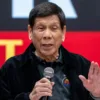South Korea’s Constitutional Court began the impeachment trial of President Yoon Suk Yeol on Tuesday, over his failed attempt to impose martial law, but the session was quickly adjourned after Yoon failed to appear.
Yoon’s controversial power grab on December 3 sparked the country’s worst political crisis in decades when he ordered soldiers to storm parliament in a bid to prevent lawmakers from voting to end his suspension of civilian rule.
The attempt, which ultimately failed, led to Yoon’s impeachment and suspension from office. Since then, Yoon has secluded himself at his residence, evading summons from investigators who are probing him on charges of insurrection, and using his presidential security team to block arrest attempts.
The first of five scheduled hearings began at 2:00 pm (0500 GMT) but was adjourned within minutes due to Yoon’s absence, which his legal team attributed to safety concerns. The court has confirmed that the hearings will continue without his presence, with the next session scheduled for Thursday. Additional hearings are planned for January 21, January 23, and February 4.
The eight judges of the Constitutional Court will focus on two key issues: whether Yoon’s martial law declaration was unconstitutional and whether it was illegal. A majority of six out of the eight judges must vote in favor of his impeachment for Yoon to be removed from office.
Prior to the trial, the National Assembly’s legal team stated that there were “overwhelming reasons” for Yoon’s immediate dismissal. The court has up to 180 days, starting from December 14 when it received the case, to reach its verdict.
Yoon’s legal team, however, has requested that the full 180 days be utilized, arguing that it is necessary to fully investigate the events leading to the martial law declaration. The martial law attempt, which lasted just six hours, was the first of its kind in over four decades.
“This impeachment case focuses solely on the martial law situation,” said Yoon’s lawyer, Kim Nam-ju. “Since most individuals involved have already been indicted and the facts have largely been established, we don’t expect the process to be lengthy.”
In addition to the impeachment trial, the country is grappling with ongoing political instability. Last month, lawmakers impeached Yoon’s interim replacement, further deepening the crisis. The current acting president has called for dialogue but appears unwilling to take a strong stance in the ongoing political standoff.
In a parallel criminal investigation, a joint task force from the Corruption Investigation Office (CIO) and police is preparing for a renewed attempt to arrest Yoon on charges of insurrection. A previous arrest attempt failed when Yoon’s presidential guards blocked access to investigators, while protests from rival factions took place outside his residence.
Yoon’s chief of staff, Chung Jin-suk, stated that the office was “ready to consider all options for investigation or visits” to the president at a “third location.” If the new warrant is successfully executed, Yoon would become the first sitting South Korean president to be arrested. Should he be convicted, Yoon could face prison or even the death penalty.
The CIO has confirmed that preparations for the arrest are ongoing, with police reportedly mobilizing 1,000 investigators for the attempt. Yoon’s residence has been fortified with barbed wire and bus barricades, while a military unit patrols the area. However, the defense ministry clarified that the military would not be involved in the execution of the arrest warrant.
Political experts warn that a failure to arrest Yoon could have serious consequences for both the investigators and South Korean society at large. “If the CIO fails to execute the second arrest warrant, it could face a significant crisis regarding its future,” said Lee Jae-mook, a political science professor at Hankuk University of Foreign Studies. “If this situation persists, we may witness an increase in social unrest.”
AFP


